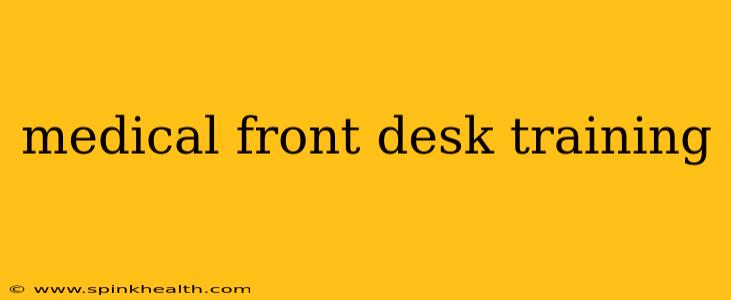The medical front desk is the heartbeat of any clinic or hospital. It's the first point of contact for patients, setting the tone for their entire experience. A well-trained front desk staff isn't just about scheduling appointments; it's about providing compassionate care, efficient service, and a professional environment. This comprehensive guide delves into the essential skills and knowledge needed for medical front desk training, transforming you from a newcomer to a confident and capable professional.
What are the Key Responsibilities of a Medical Front Desk Staff?
Imagine this: It’s 8 AM, the phone is ringing, and patients are arriving. Your day as a medical front desk professional begins with a flurry of activity. Your key responsibilities extend far beyond simply answering phones and scheduling appointments. You're the first line of defense, responsible for:
-
Patient Scheduling: This involves managing appointment calendars, ensuring efficient use of doctor's time, and accommodating patient needs. You’ll be handling rescheduling, cancellations, and coordinating with other departments.
-
Patient Registration and Insurance Verification: Accurately collecting patient information, verifying insurance coverage, and ensuring proper documentation are crucial for smooth billing processes and regulatory compliance.
-
Answering Phones and Handling Inquiries: Providing prompt, courteous, and accurate answers to patient inquiries requires patience and strong communication skills. This includes directing calls, taking messages, and providing basic medical information (within your scope of knowledge).
-
Maintaining Patient Records: Ensuring patient files are up-to-date, organized, and compliant with HIPAA regulations is paramount. This includes managing electronic health records (EHRs) and maintaining physical files.
-
Processing Payments and Handling Billing: Collecting payments, processing insurance claims, and managing outstanding balances require attention to detail and a thorough understanding of medical billing procedures.
-
Managing Correspondence: Handling incoming and outgoing mail, faxes, and emails efficiently and accurately contributes to the overall organization of the office.
What Skills Are Needed for Medical Front Desk Training?
The role requires a blend of hard and soft skills. While technical skills can be learned, possessing strong interpersonal skills is essential for patient satisfaction and overall team effectiveness.
Essential Hard Skills:
- Computer proficiency: Familiarity with medical software, electronic health records (EHRs), and scheduling systems is crucial.
- Medical terminology: Understanding medical terms and abbreviations ensures accurate communication and efficient processing of information.
- Insurance knowledge: Familiarity with various insurance plans, billing procedures, and claim submission is essential for smooth financial operations.
- Data entry skills: Accurate and efficient data entry is critical for maintaining accurate patient records and managing billing processes.
- Knowledge of HIPAA regulations: Maintaining patient confidentiality and adhering to HIPAA guidelines are non-negotiable requirements.
Essential Soft Skills:
- Exceptional communication skills: Interacting professionally and empathetically with patients and colleagues is key.
- Problem-solving skills: Handling unexpected situations and resolving conflicts effectively requires resourcefulness.
- Organizational skills: Managing multiple tasks, prioritizing efficiently, and maintaining a calm demeanor under pressure are vital.
- Teamwork skills: Collaboration with doctors, nurses, and other staff members is essential for a well-functioning office.
- Time management skills: Balancing multiple tasks and meeting deadlines efficiently ensures smooth workflow.
How Long Does Medical Front Desk Training Take?
The duration of medical front desk training varies depending on the program and the individual's prior experience. Some programs offer short, intensive courses, while others provide more comprehensive training lasting several weeks or months. On-the-job training is also common, allowing new hires to learn the specifics of the clinic’s procedures and software.
What Certifications Are Available for Medical Front Desk Staff?
While not always mandatory, certifications can enhance your skills and demonstrate your commitment to professionalism. Several organizations offer certifications in medical office administration or medical assisting, which can boost your career prospects.
What is the Average Salary for a Medical Front Desk Staff?
The average salary for a medical front desk staff varies depending on location, experience, and the size of the healthcare facility. Researching salaries in your specific area can provide a more accurate picture.
How Can I Find Medical Front Desk Training Programs?
Numerous options are available, including community colleges, vocational schools, online courses, and on-the-job training. Researching programs and comparing their curricula and accreditation is essential in choosing the best fit for your needs and goals.
This comprehensive guide provides a strong foundation for your medical front desk training journey. Remember, this is a rewarding career that directly impacts patient care. By mastering the skills and knowledge outlined here, you’ll be well-prepared to excel in this dynamic and vital role within the healthcare industry.

